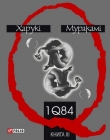
Текст книги "1q84"
Автор книги: Haruki Murakami
Жанр:
Современная проза
сообщить о нарушении
Текущая страница: 8 (всего у книги 81 страниц)
She continued, “We can’t let anyone get away with doing something like this. We simply can’t.”
Aomame gathered the photos and returned them to the envelope.
“Don’t you agree?” the dowager asked.
“I certainly do,” said Aomame.
“We did the right thing,” the dowager declared.
She left her chair and, perhaps to calm herself, picked up the watering can by her side as if taking in hand a sophisticated weapon. She was somewhat pale now, her eyes sharply focused on a corner of the hothouse. Aomame followed her gaze but saw nothing more unusual than a potted thistle.
“Thank you for coming to see me,” the dowager said, still holding the empty watering can. “I appreciate your efforts.” This seemed to signal the end of their interview.
Aomame stood and picked up her bag. “Thank you for the tea.”
“And let me thank you again,” the dowager said.
Aomame gave her a faint smile.
“You don’t have anything to worry about,” the dowager said. Her voice had regained its gentle tone. A warm glow shone in her eyes. She touched Aomame’s arm. “We did the right thing, I’m telling you.”
Aomame nodded. The woman always ended their conversations this way. Perhaps she was saying the same thing to herself repeatedly, like a prayer or mantra. “You don’t have anything to worry about. We did the right thing, I’m telling you.”
After checking to be sure there were no butterflies nearby, Aomame opened the hothouse door just enough to squeeze through, and closed it again. The dowager stayed inside, the watering can in her hand. The air outside was chilling and fresh with the smell of trees and grass. This was the real world. Here time flowed in the normal manner. Aomame inhaled the real world’s air deep into her lungs.
She found Tamaru seated in the same teak chair by the front entrance, waiting for her. His task was to hand her a key to a post office box.
“Business finished?” he asked.
“I think so,” Aomame replied. She sat down next to him, took the key, and tucked it into a compartment of her shoulder bag.
For a time, instead of speaking, they watched the birds that were visiting the garden. There was still no wind, and the branches of the willows hung motionlessly. Several branches were nearly touching the ground.
“Is the woman doing okay?” Aomame asked.
“Which woman?”
“The wife of the man who suffered the heart attack in the Shibuya hotel.”
“Doing okay? Not really. Not yet,” Tamaru said with a scowl. “She’s still in shock. She can hardly speak. It’ll take time.”
“What’s she like?”
“Early thirties. No kids. Pretty. Seems like a nice person. Stylish. Unfortunately, she won’t be wearing bathing suits this summer. Maybe not next year, either. Did you see the Polaroids?”
“Yes, just now.”
“Horrible, no?”
“Really,” Aomame said.
Tamaru said, “It’s such a common pattern. Talented guy, well thought of, good family, impressive career, high social standing.”
“But he becomes a different person at home,” Aomame said, continuing his thought. “Especially when he drinks, he becomes violent. But only toward women. His wife is the only one he can knock around. To everyone else, he shows only his good side. Everybody thinks of him as a gentle, loving husband. The wife tries to tell people what terrible things he’s doing to her, but no one will believe her. The husband knows that, so when he’s violent he chooses parts of her body she can’t easily show to people, or he’s careful not to make bruises. Is this the ‘pattern’?”
Tamaru nodded. “Pretty much. Only this guy didn’t drink. He was stone-cold sober and out in the open about it. A really ugly case. She wanted a divorce, but he absolutely refused. Who knows? Maybe he loved her. Or maybe he didn’t want to let go of such a handy victim. Or maybe he just enjoyed raping his wife.”
Tamaru raised one foot, then the other, to check the shine on his shoes again. Then he continued, “Of course, you can usually get a divorce if you have proof of domestic violence, but it takes time and it takes money. If the husband hires a good lawyer, he can make it very unpleasant for you. The family courts are full, and there’s a shortage of judges. If, in spite of all that, you do get a divorce, and the judge awards a divorce settlement or alimony, the number of men who actually pay up is small. They can get out of it all kinds of ways. In Japan, ex-husbands almost never get put in jail for not paying. If they demonstrate a willingness to pay and cough up a little bit, the courts usually look the other way. Men still have the upper hand in Japanese society.”
Aomame said, “Maybe so, but as luck would have it, one of those violent husbands suffered a heart attack in a Shibuya hotel room a few days ago.”
“ ‘As luck would have it’ is a bit too direct for me,” Tamaru said with a click of the tongue. “I prefer ‘Due to heavenly dispensation.’ In any case, no doubts have been raised regarding the cause of death, and the amount of life insurance was not so high as to attract attention, so the insurance company won’t have any suspicions. They’ll probably pay without a hitch. Finally, it’s a decent amount of money, enough for her to begin a new life. Plus she’ll be saving all the time and money that would have been eaten up by suing for divorce. When it’s over, she will have avoided all the complicated, meaningless legal procedures and all the subsequent mental anguish.”
“Not to mention that that scummy bastard won’t be set loose on some new victim.”
“Heavenly dispensation,” Tamaru said. “Everything’s settled nicely thanks to one heart attack. All’s well that ends well.”
“Assuming there’s an end somewhere,” Aomame said.
Tamaru formed some short creases near his mouth that were faintly reminiscent of a smile. “There has to be an end somewhere. It’s just that nothing’s labeled ‘This is the end.’ Is the top rung of a ladder labeled ‘This is the last rung. Please don’t step higher than this’?”
Aomame shook her head.
“It’s the same thing,” Tamaru said.
Aomame said, “If you use your common sense and keep your eyes open, it becomes clear enough where the end is.”
Tamaru nodded. “And even if it doesn’t”—he made a falling gesture with his finger “—the end is right there.”
They were both quiet for a while as they listened to the birds singing. It was a calm April afternoon without a hint of ill will or violence.
“How many women are living here now?” Aomame asked.
“Four,” Tamaru answered, without hesitation.
“All in the same kind of situation?”
“More or less.” Tamaru pursed his lips. “But the other three cases are not as serious as hers. Their men are all nasty bastards, as usual, but none are as bad as the character we’ve been talking about. These guys are lightweights who like to come on strong, not worth bothering you about. We can take care of them ourselves.”
“Legally.”
“Pretty much—even if we have to lean on them a little. Of course, a heart attack is an entirely ‘legal’ cause of death.”
“Of course,” Aomame chimed in.
Tamaru went silent for a while, resting his hands on his knees and looking at the silent branches of the willow trees.
After some hesitation, Aomame decided to broach something with Tamaru. “You know,” she said, “there’s something I’d like you to tell me.”
“What’s that?”
“How many years ago did the police get new uniforms and guns?”
Tamaru wrinkled his brow almost imperceptibly. “Where did that come from all of a sudden?”
“Nowhere special. It just popped into my head.”
Tamaru looked her in the eye. His own eyes were entirely neutral, free of expression. He was leaving himself room to go in any direction with this.
“That big shootout near Lake Motosu between the Yamanashi Prefectural Police and the radical group took place in mid-October of 1981, and the police had their major reorganization the following year. Two years ago.”
Aomame nodded without changing her expression. She had absolutely no recollection of such an event, but all she could do now was play along with him.
“It was really bloody. Old-fashioned six-shooters against five Kalashnikov AK-47s. The cops were totally outgunned. Poor guys: three of them were torn up pretty badly. They looked as if they’d been stitched on a sewing machine. The Self-Defense Force got involved right away, sending in their special paratroopers. The cops totally lost face. Prime Minister Nakasone immediately got serious about strengthening police power. There was an overall restructuring, a special weapons force was instituted, and ordinary patrolmen were given high-powered automatic pistols to carry—Beretta Model 92s. Ever fired one?”
Aomame shook her head. Far from it. She had never even fired an air rifle.
“I have,” Tamaru said. “A fifteen-shot automatic. It uses 9mm Parabellum rounds. It’s one of the great pistols. The U.S. Army uses it. It’s not cheap, but its selling point is that it’s not as expensive as a SIG or a Glock. It’s not an easy gun to use, though, is definitely not for amateurs. The old revolvers only weighed 490 grams, but these weigh 850. They’re useless in the hands of an untrained Japanese policeman. Fire a high-powered gun like that in a crowded country like Japan, and you end up hurting innocent bystanders.”
“Where did you ever fire such a thing?”
“You know, the usual story. Once upon a time I was playing my harp by a spring when a fairy appeared out of nowhere, handed me a Beretta Model 92, and told me to shoot the white rabbit over there for target practice.”
“Get serious.”
The creases by Tamaru’s mouth deepened slightly. “I’m always serious,” he said. “In any case, the cops’ official guns and uniforms changed two years ago. In the spring. Just about this time of year. Does that answer your question?”
“Two years ago,” Aomame said.
Tamaru gave her another sharp look. “You know, if something’s bothering you, you’d better tell me. Are the cops involved in something?”
“No, that’s not it,” Aomame said, waving off his suspicions with both hands. “I was just wondering about their uniforms, like, when they changed.”
A period of silence followed, bringing the conversation to a natural end. Tamaru thrust out his right hand again. “Anyhow, I’m glad it all came off without a hitch.” Aomame took his hand in hers. He understands, she told herself. After a tough job where your life is on the line, what you need is the warm, quiet encouragement that accompanies the touch of human flesh.
“Take a break,” Tamaru said. “Sometimes you need to stop, take a deep breath, and empty your head. Go to Guam or someplace with a boyfriend.”
Aomame stood up, slung her bag over her shoulder, and adjusted the hood of her parka. Tamaru also got to his feet. He was by no means tall, but when he stood up it looked as if a stone wall had suddenly materialized. His solidity always took her by surprise.
Tamaru kept his eyes fixed on her back as she walked away. She could feel him looking at her the whole time. And so she kept her chin pulled in, her back straight, and walked with firm steps as if following a perfectly straight line. But inside, where she could not be seen, she was confused. In places of which she was totally unaware, things about which she was totally unaware were happening one after another. Until a short time before, she had had the world in her hand, without disruptions or inconsistencies. But now it was falling apart.
A shootout at Lake Motosu? Beretta Model 92?
What was happening to her? Aomame could never have missed such important news. This world’s system was getting out of whack. Her mind went on churning as she walked. Whatever might have happened, she would have to do something to make the world whole again, to make it logical again. And do it now. Otherwise, outlandish things could happen.
Tamaru could probably see the confusion inside her. He was a cautious man with superb intuition. He was also very dangerous. Tamaru had a profound respect for his employer, and was fiercely loyal to her. He would do anything to protect her. Aomame and Tamaru acknowledged each other’s abilities and liked each other—or so it seemed. But if he concluded that Aomame’s existence was not to his employer’s benefit, for whatever reason, then he would not hesitate to get rid of her. Aomame couldn’t blame him for that. It was his job, after all.
The gate opened as she reached the other side of the garden. She gave the friendliest smile she could manage to the security camera, and a little wave as if there were nothing bothering her. Once she was outside the wall, the gate slowly shut behind her. As she descended the steep Azabu slope, Aomame tried to organize her thoughts and make a detailed, comprehensive list of what she should do from this point forward.
CHAPTER 8
Tengo
MEETING NEW PEOPLE IN NEW PLACES
Most people think of Sunday morning as a time for rest. Throughout his youth, however, Tengo never once thought of Sunday morning as something to enjoy. Instead, it depressed him. When the weekend came, his whole body felt sluggish and achy, and his appetite would disappear. For Tengo, Sunday was like a misshapen moon that showed only its dark side. If only Sunday would never come! he would often think as a boy. How much more fun it would be to have school every day without a break! He even prayed for Sunday not to come, though his prayers were never answered. Even now, as an adult, dark feelings would inexplicably overtake him when he awoke on a Sunday morning. He felt his joints creaking and wanted to throw up. Such a reaction to Sunday had long since permeated his heart, perhaps in some deep, unconscious region.
Tengo’s father was a collector of subscription fees for NHK—Japan’s quasi-governmental broadcasting network—and he would take little Tengo with him as he went from door to door. These rounds started before Tengo entered kindergarten and continued through the fifth grade without a single weekend off, excepting only those Sundays when there was a special function at school. Waking at seven, his father would make him scrub his face with soap and water, inspect his ears and nails, and dress him in the cleanest (but least showy) clothes he owned, promising that, in return, he would buy Tengo a yummy treat.
Tengo had no idea whether the other NHK subscription fee collectors kept working on weekends and holidays, but as far as he could remember, his father always did. If anything, he worked with even more enthusiasm than usual, because on Sundays he could often catch people who were usually out during the week.
Tengo’s father had several reasons for taking him on his rounds. One was that he could not leave the boy home alone. On weekdays and Saturdays, he could leave Tengo in daycare or kindergarten or elementary school, but these were all closed on Sundays. Another reason, he said, was that it was important for a father to show his son the type of work he did. A child should learn from early on what kind of activity supported his daily life, and he should appreciate the importance of labor. Tengo’s father had been sent out to work in the fields, Sunday or no, from the time he was old enough to understand anything, and he had even been kept out of school during the busiest seasons on the farm. To him, such a life was a given.
His third and final reason was a more calculating one, which is why it left the deepest scars on Tengo’s heart. His father knew that having a small child with him made his job easier. When a fee collector had a child in hand, people found it more difficult to say to him, “I don’t want to pay, so get out of here.” With a little person staring up at them, even people determined not to pay would usually end up forking over the money, which was why he saved the most difficult routes for Sunday. Tengo sensed from the beginning that this was the role he was expected to play, and he absolutely hated it. But he also felt that he had to act out his role as cleverly as he could in order to please his father. He might as well have been a trained monkey. If he pleased his father, he would be treated kindly that day.
Tengo’s one salvation was that his father’s route was fairly far from home. They lived in a suburban residential district outside the city of Ichikawa, but his father’s rounds were in the center of the city. The school district was different there as well. At least he was able to avoid doing collections at the homes of his kindergarten and elementary school classmates. Occasionally, though, when walking in the downtown shopping area, he would spot a classmate on the street. When this happened, he would dodge behind his father to keep from being noticed.
Most of Tengo’s school friends had fathers who commuted to office jobs in the center of Tokyo. These men thought of Ichikawa as a part of Tokyo that just happened to have been incorporated into Chiba Prefecture. On Monday mornings his school friends would talk excitedly about where they had gone and what they had done on Sunday. They went to amusement parks and zoos and baseball games. In the summer they would go swimming, in the winter skiing. Their fathers would take them for drives or to go hiking. They would share their experiences with enthusiasm, and exchange information about new places. But Tengo had nothing to talk about. He never went to tourist attractions or amusement parks. From morning to evening on Sundays, he and his father would ring the doorbells of strangers’ houses, bow their heads, and take money from the people who came to the door. If someone didn’t want to pay, his father would threaten or cajole them. With anyone who tried to talk his way out of paying, he would have an argument. Sometimes he would curse at them like stray dogs. Such experiences were not the kind of thing Tengo could share with school friends.
When Tengo was in the third grade, word spread that his father was an NHK subscription fee collector. Someone had probably seen them making their rounds together. He was, after all, walking all day long behind his father to every corner of the city every Sunday, so it was almost inevitable that he would be spotted at some point (especially now that he was too big to hide behind his father). Indeed, it was surprising that it hadn’t happened before.
From that point on, Tengo’s nickname became “NHK.” He could not help becoming a kind of alien in a society of middle-class children of white-collar workers. Much of what they took for granted, Tengo could not. He lived a different kind of life in a different world. His grades were outstanding, as was his athletic ability. He was big and strong, and the teachers focused on him. So even though he was an “alien,” he was never a class outcast. If anything, in most circumstances he was treated with respect. But whenever the other boys invited him to go somewhere or to visit their homes on a Sunday, he had to turn them down. He knew that if he told his father, “Some of the boys are getting together this Sunday at so-and-so’s house,” it wouldn’t make any difference. Soon, people stopped inviting him. Before long he realized that he didn’t belong to any groups. He was always alone.
Sunday collection rounds were an absolute rule: no exceptions, no changes. If he caught a cold, if he had a persistent cough, if he was running a little fever, if he had an upset stomach, his father accepted no excuses. Staggering after his father on such days, he would often wish he could fall down and die on the spot. Then, perhaps, his father might think twice about his own behavior; it might occur to him that he had been too strict with his son. For better or worse, though, Tengo was born with a robust constitution. Even if he had a fever or a stomachache or felt nauseous, he always walked the entire long route with his father, never falling down or fainting, and never complaining.
Tengo’s father was repatriated from Manchuria, destitute, when the war ended in 1945. Born the third son of a farming family in the hardscrabble Tohoku region, he joined a homesteaders’ group and crossed over to Manchuria in the 1930s with friends from the same prefecture. None of them had swallowed whole the government’s claims that Manchuria was a paradise where the land was vast and rich, offering an affluent life to all comers. They knew enough to realize that “paradise” was not to be found anywhere. They were simply poor and hungry. The best they could hope for if they stayed at home was a life on the brink of starvation. The times were terrible, and huge numbers of people were unemployed. The cities offered no hope of finding decent work. This left crossing the sea to Manchuria as virtually the only way to survive. As farmers developing new land, they received basic training in the use of firearms in case of emergency, were given some minimal information about farming conditions in Manchuria, were sent off with three cheers from their villages, and then were transported by train from the port of Dalian to a place near the Manchurian-Mongolian border. There they were given some land and farming implements and small arms, and together started cultivating the earth. The soil was poor and rocky, and in winter everything froze. Sometimes stray dogs were all they had to eat. Even so, with government support the first few years, they managed to get by.
Their lives were finally becoming more stable when, in August 1945, the Soviet Union broke its neutrality treaty with Japan and launched a full-scale invasion of Manchuria. Having ended its operations on the European front, the Soviet army had used the Trans-Siberian Railway to shift a huge military force to the Far East in preparation for the border crossing. Tengo’s father had been expecting this to happen, having been secretly informed of the impending situation by a certain official, a man he had become friendly with thanks to a distant connection. The man had told him privately that Japan’s weakened Kwantung Army could never stand up to such an invasion, so he should prepare to flee with the clothes on his back as soon as it happened—the sooner the better. The minute he heard the news that the Soviet army had apparently violated the border, he mounted his horse, galloped to the local train station, and boarded the second-to-last train for Dalian. He was the only one among his farming companions to make it back to Japan before the end of the year.
He went to Tokyo after the war and tried making a living as a black marketeer and as a carpenter’s apprentice, but nothing seemed to work. He could barely keep himself alive. He was working as a liquor store delivery man in the Asakusa entertainment district when he bumped into an acquaintance from his Manchurian days on the street. It was the official who had warned him of the impending Soviet invasion. The man had originally gone over to work for the postal service in Japan’s Manchukuo puppet state, and now that he was back in Japan he had his old job back with the Ministry of Communications. He seemed to like Tengo’s father, both because they came from the same village and because he knew what a hard worker he was. He invited him to share a bite.
When the man learned that Tengo’s father was having a hard time finding a decent job, he asked if he might be interested in working as a subscription fee collector for NHK. He offered to recommend him to a friend in that department, and Tengo’s father gladly accepted. He knew almost nothing about NHK, but he was willing to try anything that promised a steady income. The man wrote him a letter of recommendation and even served as a guarantor for him, smoothing his way to become an NHK subscription fee collector. They gave him training, a uniform, and a quota to fill. People then were just beginning to recover from the shock of defeat and to look for entertainment in their destitute lives. Radio was the most accessible and cheapest form of entertainment; and postwar radio, which offered music, comedy, and sports, was incomparably more popular than its wartime predecessor, with its virtuous exhortations for patriotic self-sacrifice. NHK needed huge numbers of people to go from door to door collecting listeners’ fees.
Tengo’s father performed his duties with great enthusiasm. His foremost strengths were his sturdy constitution and his perseverance in the face of adversity. Here was a man who had barely eaten a filling meal since birth. To a person like that, the collection of NHK fees was not excruciating work. The most violent curses hurled at him were nothing. Moreover, he felt much satisfaction at belonging to a gigantic organization, even as one of its lowest-ranking members. He worked for one year as a commissioned collector without job security, his only income a percentage of his collections, but his performance and attitude were so outstanding that he was taken directly into the ranks of the full-fledged employees, an almost unheard-of achievement in NHK. Part of this had to do with his superior results in an especially difficult collection area, but also effective here was the influence of his guarantor, the Communications Ministry official. Soon he received a set basic salary plus expenses. He was able to move into a corporation-owned apartment and join the health care plan. The difference in treatment was like night and day. It was the greatest stroke of good fortune he had ever encountered in life. In other words, he had finally worked his way up to the lowest spot on the totem pole.
Young Tengo heard this story from his father so many times that he grew sick of it. His father never sang him lullabies, never read storybooks to him at bedtime. Instead, he would tell the boy stories of his actual experiences—over and over, from his childhood in a poor farm family in Tohoku, through the ultimate (and inevitable) happy ending of his good fortune as a fully fledged NHK fee collector.
His father was a good storyteller. There was no way for Tengo to ascertain how much was based on fact, but the stories were at least coherent and consistent. They were not exactly pregnant with deep meaning, but the details were lively and his father’s narrative was strongly colored. There were funny stories, touching stories, and violent stories. There were astounding, preposterous stories and stories that Tengo had trouble following no matter how many times he heard them. If a life was to be measured by the color and variety of its episodes, his father’s life could be said to have been rich in its own way, perhaps.
But when they touched on the period after he became a full-fledged NHK employee, his father’s stories suddenly lost all color and reality. They lacked detail and wholeness, as if he thought of them as mere sequels not worth telling. He met a woman, married her, and had a child—that is, Tengo. A few months after Tengo was born, his mother fell ill and died. His father raised him alone after that, never remarrying, just working hard for NHK. The End.
How he happened to meet Tengo’s mother and marry her, what kind of woman she was, what had caused her death (could it have had something to do with Tengo’s birth?), whether her death had been a relatively easy one or she had suffered greatly—his father told him almost nothing about such matters. If Tengo tried asking, his father would just evade the question and, finally, never answer. Most of the time, such questions put him in a foul mood, and he would clam up. Not a single photo of Tengo’s mother had survived, and not a single wedding photo. “We couldn’t afford a ceremony,” he explained, “and I didn’t have a camera.”
But Tengo fundamentally disbelieved his father’s story. His father was hiding the facts, remaking the story. His mother had not died some months after he was born. In his only memory of her, she was still alive when he was one and a half. And near where he was sleeping, she was in the arms of a man other than his father.
His mother took off her blouse, dropped the straps of her slip, and let a man not his father suck on her breasts. Tengo slept next to them, his breathing audible. But at the same time, Tengo was not asleep. He was watching his mother.
This was Tengo’s souvenir photograph of his mother. The ten-second scene was burned into his brain with perfect clarity. It was the only concrete information he had about his mother, the one tenuous connection his mind could make with her. They were linked by a hypothetical umbilical cord. His mind floated in the amniotic fluid of memory, listening for echoes of the past. His father, meanwhile, had no idea that such a vivid scene was burned into Tengo’s brain or that, like a cow in the meadow, Tengo was endlessly regurgitating fragments of the scene to chew on, a cud from which he obtained essential nutrients. Father and son: each was locked in a deep, dark embrace with his secrets.
It was a clear, pleasant Sunday morning. There was a chill in the mid-April breeze, though, a reminder of how easily the seasons can turn backward. Over a thin, black crew-neck sweater, Tengo wore a herringbone jacket that he had owned since his college days. He also had on beige chino pants and brown Hush Puppies. The shoes were rather new. This was as close as he could come to dapper attire.
When Tengo reached the front end of the outward-bound Chuo Line platform in Shinjuku Station, Fuka-Eri was already there, sitting alone on a bench, utterly still, staring into space with narrowed eyes. She wore a cotton print dress that had to be meant for midsummer. Over the dress she wore a heavy, grass-green winter cardigan, and on her bare feet she wore faded gray sneakers—a somewhat odd combination for the season. The dress was too thin, the cardigan too thick. On her, though, the outfit did not seem especially out of place. Perhaps she was expressing her own special worldview by this mismatch. It was not entirely out of the question. But probably she had just chosen her clothing at random without much thought.
She was not reading a newspaper, she was not reading a book, she was not listening to a Walkman, she was just sitting still, her big, black eyes staring straight ahead. She could have been staring at something or looking at nothing at all. She could have been thinking about something or not thinking at all. From a distance, she looked like a realistic sculpture made of some special material.





